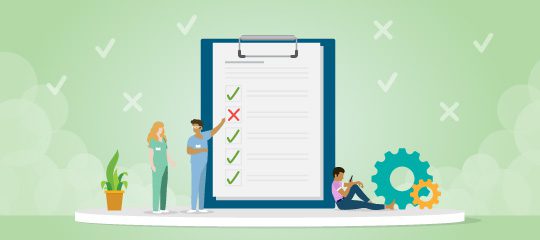Importance of Repetition to Ensure Safety
A new cycle of annual, mandatory education and training will soon begin in organizations nationwide. Some common topics for healthcare facilities are: HIPAA, Infection Control, Back Safety, Patient Rights, Mandatory Reportable Incidents, a host of patient safety topics, and more.
It’s easy to understand why employees consider it a chore to complete the myriad of modules they’re assigned. Year after year they review the same information with only a few changes or updates, but it’s important to have regular training on these high-risk topics that could serve to save a life or prevent serious harm to themselves, patients, visitors, co-workers, the public and the organization.
Although information covered in some topics, like infection control for example, may never be needed by many employees, if or when a hazardous situation arises, they will need to be able to immediately recall the various emergency action steps necessary to keep themselves and others safe. Without regular training updates, those details could easily be forgotten.
Organizations are required to provide regular, ongoing training on a variety of topics to comply with federal and state regulatory entities whose primary purpose is to ensure safety and prevent harm, such as the Centers for Medicare & Medicaid Services (CMS), The Joint Commission, and the Occupational Safety and Health Administration (OSHA).
4 Ways to Kick Start the New Cycle
Here are four ways leaders can get the most out of annual training and make the process more meaningful for staff.
1. Set the Right Tone
No, you won’t receive any applause when you announce that it’s time to complete annual training again, but it might be met with less disapproval when you acknowledge the task, approach it with some enthusiasm, and set a positive example by being one of the first to complete it. When staff see your commitment, it sends the message that it’s important.
2. Set Reasonable Expectations
Let them know in advance what topics will be included, where to find the training, when it will be available, the length of time it will take, the deadline for completing it, and any other pertinent information. When staff know what to expect from the process, they’re able to anticipate, adjust, and accommodate.
3. Make it Relevant and Meaningful
When staff understand why mandatory training is important, they’re more likely to embrace it, take it seriously, and pay close attention. Use stories that are relevant to the topics. Make it meaningful by discussing ways training has led to positive outcomes or has prevented harm for staff and patients within your organization.
4. Double Your Staff’s Rewards
It’s true that your staff wins when they use continuing education courses to learn more, but how about giving them a little extra incentive to complete their training? Contests, drawings and challenges can be a fun way to encourage training knowledge, so get creative. Hold a contest by unit or department to reward the first 20 percent that complete their training, offer the chance to win a hefty gift basket if training is completed by a specific date or create a contest asking staff to share a time when they used the information learned in annual training.

Advantages of Online Learning for Mandatory Training
Here are the top advantages online learning provides:
Accessibility: Participants can access course materials 24 hours a day, 7 days a week, from anywhere they have web access. This provides busy professionals with the flexibility they need to learn when and where it best meets their needs
Control of learning pace: Online learning provides opportunities for participants to control their pace of learning. They can start, stop, review, and move through content as slowly or quickly as they need.
Immediate results: Most online courses provide immediate results of tests and quizzes.
Better retention: Clever instructional design, user experience, and multimedia options can provide a richer, more effective learning experience than traditional methods.
Access to resources: Many online learning platforms provide participants with a variety of learning resources, such as PowerPoints, handouts, charts, graphs, manuscripts, outlines, and links to additional helpful tools.
Track progress: Some online learning providers allow participants to complete courses in more than one sitting, by saving progress and bookmarking it for completion later.
No distractions: With online learning, participants can engage in learning activities free of distractions, interruptions, side discussions, and stories that often come with traditional classroom experiences.
e-transcripts: Some providers of online learning save course completion information and transcripts that can be accessed and printed when needed for reporting of continuing education to licensing and certification authorities and employers.
Search functions: Online search functions allow participants to easily and quickly locate courses and that meets their needs.
Saves money: Utilizing online learning eliminates travel expenses and hefty registration costs for on-site seminars.
Final Thoughts
Achieving compliance goes beyond checking a box. Developing your staff’s knowledge and skills has a direct impact on meeting quality measures and patient satisfaction. Online education and tools help you to easily manage and track compliance while engaging your staff, mitigating risk and maximizing reimbursements. Creating a culture of safety begins with a well-trained workforce.
Editor’s note: This blog was originally published in December 2018 and has been updated with new content.

Compliance is the Foundation Resource Toolkit
To help your organization achieve and maintain compliance, we've put together a resource toolkit that contains helpful infographics, e-books, and white papers.
Download the resource toolkit →





